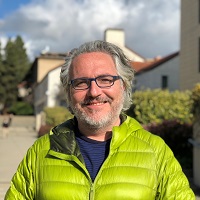Luis F. Larrondo, Ph.D.

- Title
- Assistant Professor
- Department
- Department of Molecular Genetics and Microbiology
- Institution
- Pontifical Catholic University of Chile
- Address
- Alameda 340
- City
- Santiago
- Country
- Chile
- [email protected]
- Website
- http://eng.bio.puc.cl/academicos/10859-luis-f-larrondo

- Research field
- Developmental biology; genetics
- Award year
- 2004
- Country of origin
- Chile
- Mentor name
- Jay C. Dunlap, Ph.D.
Research
Our lab is interested in studying the circadian control of gene expression. Hence, we investigate the underlying mechanisms involved in this process, by using classic genetics, molecular and cell biology techniques, as well as luciferase-based high-throughput screenings to unravel the intricate mechanisms that control as much as thousands of clock controlled genes.Circadian rhythms are biological rhythms with a period close to 24 hrs (circa dies), which are endogenous, entrainable and temperature compensated. They play key regulatory roles in many biological processes in almost all living creatures. Disruption of the circadian regulation has physiological impacts that have been linked to several conditions including depression, cancer as well as the famous jetlag experienced by regular travelers.The questions that our lab is investigating include: what are the transcriptional mechanisms that lead to daily controlled gene expression? Why is a particular gene expressed during the night, but not the day? How does the temporal information travel form the central oscillator to the different clock controlled genes? To tackle these questions we are using the ascomycete Neurospora crassa, a model system that has played a key role in the study of circadian biology. This fungus constitutes an excellent model organism: its genome is fully sequenced; knockouts have been generated for over 80% of its ten thousand genes, and forward and reverse genetics approaches are feasible. This, in addition to its haploid condition, diversity of molecular tools, greatly facilitates the analysis of complex systems as circadian clocks.